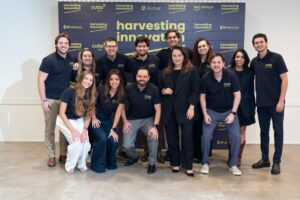Not all startup funding comes from flashy VCs and blockbuster IPOs.
“We are an agricultural biotech company and our core purpose is really to feed the world responsibly,” Chad Keyser, insect pathologist and entomologist at AgBiome told AFN. “The sweet potato weevil is a very difficult pest to control and it is a serious pest in Africa. So the Bill and Melinda Gates Foundation, which looks to partner with different companies or research groups that have the skillset to solve these different problems, asked us if we’d be willing to work on this.” Keyser talked to AFN in the wake of receiving additional grant funding for phase two of this project from the foundation that’s long been a supporter of the company through both equity investment and grant funding.
The sweet potato weevil dwells underground and lays its eggs in the plant’s roots, making it hard to target with conventional chemical inputs. If a US farmer finds that his or her crop has been contaminated with sweet potato weevils, he or she has to enter into a three-year quarantine before sweet potatoes can be planted again.
In sub-Saharan Africa, sweet potatoes are a key dietary staple and a supplemental food crop primarily grown by smallholder farmers. The sweet potato weevil causes African farmers losses of 60% to 100% in some cases if the farmer does not treat it.
“Farmers in most of these locations currently have no inputs, so all of their control methods are cultural, which means just trying to manipulate how they are planting or when they plant or how they harvest to reduce the impact. It’s not a very effective system. What they often do is when they plant, they mound soil around the plant hoping to keep the weevil from burrowing to the root, but as the soil dries and cracks, the weevil can get to the plant root,” Keyser says.
During phase one, the company demonstrated that it’s microbial capture and screening program could find microbes that may have some ability to target and destroy the sweet potato weevil. AgBiome isolated over 25,000 new microbes for screening, including seven bacteria and 15 fungi with activity against the weevil. Just like humans, organisms can get sick. The process of identifying a promising microbe is essentially an endeavor in finding which ones have the ability to make sweet potato weevils sick.
“The tricky part about this is a lot of microorganisms are specific to their host, so something that is active on one beetle won’t be active on another. Eight-thousand of the bacterial strains that we examined came from Uganda. We found several were active against the weevils and we set up collaborations with Louisana State University and an ag research group in Uganda. Both had expertise with sweet potato weevil testing. From that, we found multiple that were active against sweet potato weevils.”
AgBiome is now moving to the second step in a multi-phased project focused on finding a biological treatment for the sweet potato weevil. During phase two, AgBiome will move the work forward by testing leading strains in greenhouse and field trials against the sweet potato weevil. Phase two will end with the early development of a biological product.
“We aren’t entirely clear right now on what the product concept will be, but because we are funded by the Gates Foundation, we are obligated to provide it to African nations at a reduced or very low cost. One of the options we are exploring now is an agro-eco-economic option that would allow us to train farmers in the community how to grow microorganisms themselves and distribute them in their community.”
Biologics have substantial promise for reducing farmers’ dependence on traditional chemical inputs that have created a slew of environmental problems like poor soil, herbicide-resistant weeds, and diminished water quality. But because they are living organisms that are susceptible to temperature fluctuations, shipping them through existing distribution channels is a challenge. There is also a hearty amount of skepticism among farmers about their consistency and efficacy. Chemical inputs have largely created a plug and play system, while biologics require more holistic planning and observation.
“There are advantages to biologicals but also disadvantages. They are living organisms susceptible to a lot of environmental and abiotic factors. In Africa right now they have no reasonable control options. A biologic that could potentially provide season-long control would be very beneficial even if it only reduced sweet potato weevil populations by a fraction.”





